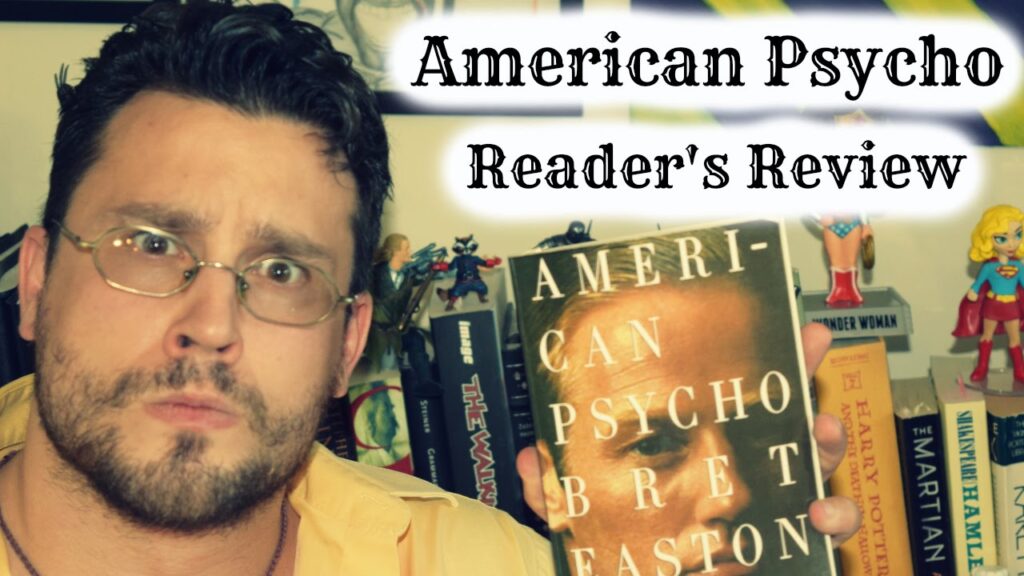
American Psycho Bret Easton Ellis is more than just a novel—it is a cultural phenomenon that has generated extensive analysis, debate, and admiration over the years. From its controversial content to its piercing social critique, American Psycho has transcended its initial shock value to become a cornerstone of modern literature. But what exactly makes it a cult classic? This article will explore the key elements that have helped American Psycho maintain its status as one of the most important and provocative novels in contemporary fiction.
American Psycho, published in 1991 by Bret Easton Ellis, is a novel that challenges readers to confront the uncomfortable truths of modern society. Its protagonist, Patrick Bateman, is a wealthy New York investment banker who lives a double life: one of privilege and prestige, the other of violent, sadistic tendencies. The novel is as much a social commentary as it is a psychological thriller, and this dual nature is what makes it stand out in modern literature.
The novel’s shocking depictions of violence and its scathing critique of capitalism, materialism, and consumer culture have earned it both admiration and controversy. Despite its initial reception as highly controversial, American Psycho has since grown into a cult classic, sparking conversations in literature, pop culture, and philosophy.
This article delves into the elements that have made American Psycho a must-read in the canon of modern literature, examining the key themes, literary techniques, and psychological depth that continue to resonate with readers today.
The Making of American Psycho as a Cult Classic
American Psycho didn’t earn its cult classic status overnight. It is the result of a careful blend of social critique, psychological exploration, and shock value. At the heart of its success is Ellis’s ability to tap into the anxieties and excesses of 1980s New York, a world that values wealth and status above all else. But how did it evolve into a cultural phenomenon?
1. The 1980s Context: The Age of Excess
In the 1980s, New York City was at the height of its capitalist boom. The city was thriving with wealth, materialism, and consumer-driven desires. Ellis captures this atmosphere in American Psycho, presenting a world where the pursuit of money and status dominates everything. Through the lens of Patrick Bateman, the novel explores how this environment breeds alienation and moral ambiguity.
2. Shock Value and Social Commentary
When American Psycho was first released, its graphic depictions of violence and disturbing scenes shocked many readers and critics alike. This was part of its brilliance—Ellis used violence not merely for shock but as a reflection of the emptiness and detachment caused by capitalism and materialism. Bateman’s violent acts represent his rejection of the hollow world around him, where everything is driven by superficial values. This contrast between hyperreality and the true nature of his violence continues to spark critical conversations today.
Key Themes in American Psycho That Define Its Legacy
What makes American Psycho a cult classic is its ability to address profound themes that are still relevant today. Through Bateman’s character and Ellis’s narrative techniques, the novel explores themes of identity, capitalism, and psychological horror.
1. Nihilism and Moral Ambiguity
At the core of American Psycho lies the philosophy of nihilism, the belief that life is without objective meaning. Bateman’s life reflects this nihilism, as he drifts through his days, indulging in consumerism and violence, all while feeling an emotional void. His lack of empathy and disconnection from society reveal a deeper truth about the emptiness of modern existence. The novel challenges readers to question whether true morality exists in a world obsessed with wealth and status.
2. The Antihero and Identity Crisis
Patrick Bateman is not a traditional hero but an antihero, whose actions defy the typical moral compass. His character is a complex reflection of the identity crisis many face in the hyper-materialistic world. On the outside, he presents a polished, wealthy persona, but beneath this facade lies a deeply disturbed individual who is disconnected from his own identity. This identity crisis mirrors the societal alienation felt by individuals in a culture obsessed with appearances and success. Bateman’s journey reflects the inner conflict of someone who cannot reconcile their true self with the external pressures of society.
3. Critique of Capitalism and Consumerism
Ellis uses Bateman’s obsession with material wealth to critique the capitalist system that drives much of modern society. The novel explores the dehumanizing effects of a world that values wealth, appearance, and status above all else. Bateman’s materialism is not just about owning luxury goods—it’s a reflection of his belief that success is measured solely by external achievements. Through Bateman, Ellis critiques the emptiness of a consumer-driven world that disregards moral or emotional depth.
4. Violence as a Symbol of Alienation
The graphic violence in American Psycho is one of its most controversial aspects, but it also serves a deeper purpose. The violence is a direct consequence of Bateman’s alienation and frustration with the world around him. In a society where appearances are everything, Bateman turns to violence as an expression of his frustration. This violence symbolizes the breakdown of moral boundaries in a world that prioritizes material success over human connection. It’s a psychological thriller that shows how an unchecked obsession with consumerism can lead to destruction.
Patrick Bateman: The Antihero and Unreliable Narrator
Patrick Bateman is perhaps one of the most iconic antiheroes in contemporary literature. His unreliable narration is a key element in American Psycho, making the novel both unsettling and fascinating.
1. Bateman as the Antihero
An antihero is a protagonist who lacks the typical virtues and moral clarity associated with traditional heroes. Bateman epitomizes this concept—he is wealthy, charming, and outwardly successful, but he is also morally bankrupt, emotionally disconnected, and prone to acts of extreme violence. Bateman’s actions challenge the traditional hero narrative, and in doing so, Ellis forces readers to confront uncomfortable truths about society’s obsession with wealth, power, and control.
2. The Unreliable Narrator
One of the defining features of Bateman’s character is his status as an unreliable narrator. Throughout the novel, Bateman presents a version of reality that is distorted by his own perceptions and emotions. This narrative device creates psychological horror, as readers are left questioning what is real and what is imagined. Bateman’s perception of the world around him becomes increasingly detached from reality, reflecting his identity crisis and growing disconnection from the world. The unreliable narration technique adds a layer of complexity to the novel, making it more than just a violent thriller—it becomes a deep psychological exploration of the mind of an antihero.
Literary Techniques in American Psycho That Enhance Its Impact
Bret Easton Ellis employs several literary techniques that not only enhance the psychological complexity of American Psycho but also deepen its thematic exploration. These techniques contribute to its status as a cult classic in modern literature.
1. Satire and Black Comedy
Ellis uses satire to critique the excessive consumerism of the 1980s. Bateman’s obsession with name-brand items, exclusive clubs, and material possessions is exaggerated to the point of absurdity, highlighting the ridiculousness of a world that values appearance over substance. Black comedy is also used throughout the novel to provide moments of dark humor, often juxtaposing Bateman’s violent tendencies with mundane, superficial concerns. This sharp satire helps expose the emptiness of a world driven by materialism.
2. Hyperreality and Postmodernism
The novel plays with the concept of hyperreality, where Bateman’s experiences blur the line between reality and fantasy. His increasing inability to distinguish between the two reflects the postmodern condition, where subjective reality and objective truth are often in conflict. This creates a sense of confusion and disorientation in the reader, enhancing the novel’s themes of alienation and moral collapse.
3. Unreliable Narration and Psychological Horror
As discussed earlier, Bateman’s unreliable narration plays a crucial role in the novel. By telling the story through Bateman’s distorted perspective, Ellis creates a psychological thriller that challenges readers to engage with the text on a deeper level. The narrative uncertainty leaves readers questioning the true nature of Bateman’s actions, creating an atmosphere of psychological horror and suspense.
The Cultural Impact of American Psycho
Since its release, American Psycho has become more than just a novel—it has left a profound mark on popular culture, from film adaptations to critical discussions in literature and philosophy.
1. Film Adaptation and Pop Culture
The 2000 film adaptation of American Psycho, starring Christian Bale as Patrick Bateman, brought the novel’s critique of capitalism and consumerism to an even wider audience. The film has since become a cult classic in its own right, cementing Bateman’s status as an iconic character in modern pop culture.
2. Philosophical and Literary Discussions
American Psycho has sparked endless debates on the nature of morality, identity, and the consequences of unchecked consumerism. Its psychological horror and exploration of the human psyche continue to be subjects of academic study, with scholars examining its critique of modern society and its place within the postmodern literary tradition.
FAQs
What makes American Psycho a cult classic?
American Psycho is considered a cult classic due to its unique blend of psychological horror, satire, and social commentary. The novel critiques 1980s capitalism and materialism, offering a disturbingly realistic portrayal of alienation and identity crisis in modern society.
Who is Patrick Bateman?
Patrick Bateman is the antihero of American Psycho. He is a wealthy investment banker who leads a double life, outwardly successful yet deeply disturbed. His violent tendencies and identity crisis make him a complex and unforgettable character.
How does American Psycho critique capitalism?
The novel critiques capitalism by showing how society’s obsession with materialism and consumer culture leads to moral ambiguity and psychological alienation. Bateman’s character embodies the emptiness of a life driven by wealth and status.
Is American Psycho relevant today?
Yes, American Psycho remains relevant due to its sharp critique of materialism, consumerism, and capitalism. These themes continue to resonate in today’s society, where similar issues persist in both social and economic spheres.
Why is Bateman considered an unreliable narrator?
Bateman is an unreliable narrator because his perspective on reality is distorted. As the story unfolds, it becomes unclear what is real and what is a product of Bateman’s delusions, creating an unsettling atmosphere of psychological horror.






